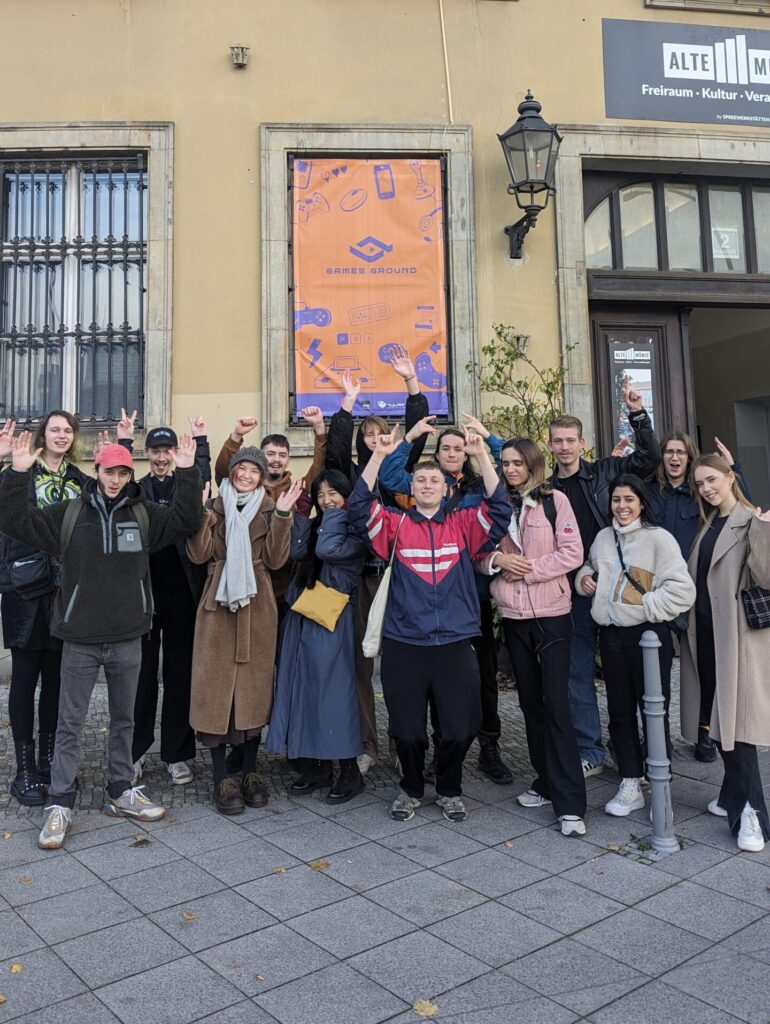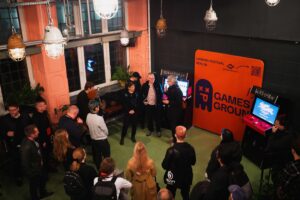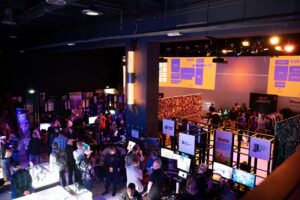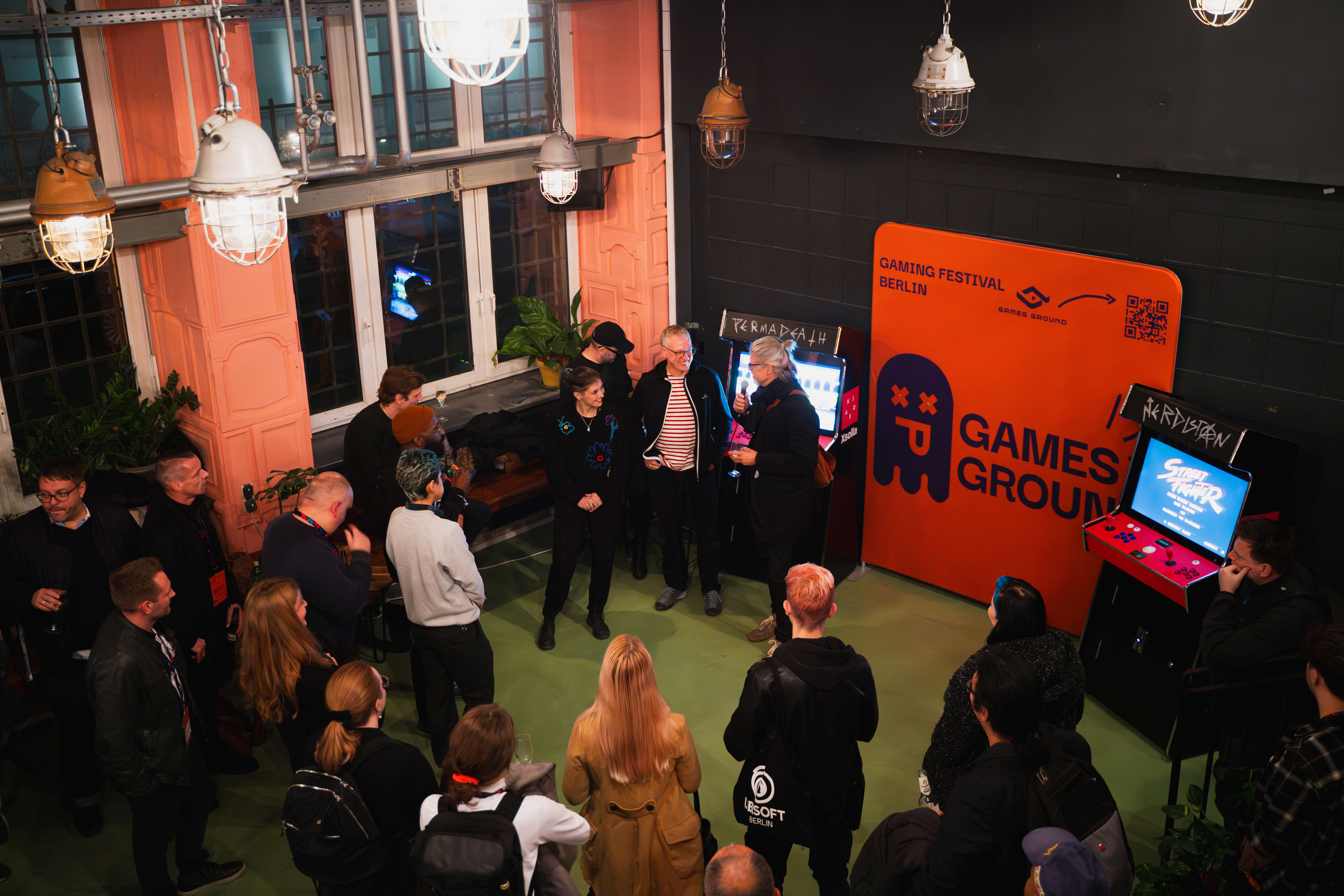In November 2023, the first edition of Berlin’s newest gaming festival, Games Ground, took the city by storm. Dedicated to all things video games, Games Ground brought developers, publishers and fans together for three days of networking, play and collaboration.
On the second day of the festival, students and alumni from our Game Sound & Music class (a final-year module available on our bachelor’s Music Production course) had the opportunity to take their learning out of the classroom and attend Games Ground.
Following introductions from the Games Ground team to exhibiting indie developers, our students got stuck into all the festival had to offer: trying out games in development, networking, and presenting their skills as audio designers.
After the festival, we sat down with Lucretia Wittnerova and Alban König, two of our third-year Music Production students, to get the scoop.
 Hey Lucretia, hey Alban! To start us off, can you tell us a little bit about yourselves?
Hey Lucretia, hey Alban! To start us off, can you tell us a little bit about yourselves?
Lucretia: My name’s Lucretia and I’m a third year Music Production student.
I’ve loved playing games my whole life, and have a particular passion for indie games. When we got the opportunity to attend Games Ground as part of our Game Sound & Music class with our lecturer, Awu, I was super excited. I couldn’t wait to try out some new video games – a lot of which were still in development – and meet the teams behind said games.
Alban: I’m Alban and I’m also in my third year of the Music Production programme at BIMM University Berlin.
When it came to the final year of my Music Production studies, I knew I wanted to choose the Game Sound & Music module as one of my options. One of my specialisms as a producer is scoring for film, so I wanted to take the skills I had gained there and apply them to the world of video games.
It’d be great to hear more about the Game Sound & Music module. What’s the class all about?
Lucretia: The class teaches us the principles of effectively creating sound and music for video games. We are using the game engine Unity and the audio middleware FMOD to learn how music and sound are implemented into games, and also how adaptive music works. We’re also learning about how to design sound for a specific character in a game and are using various composition techniques to make game music immersive.
I chose the module because video games have always touched my heart. Ever since I can remember, my Dad would buy me consoles and games. Game music is a big inspiration in all the music I make, even if I’m not consciously using it. One of the career paths I’m considering after BIMM is sound design for video games, so this module is obviously a great match for me.
Alban: I think Lucretia summed it up pretty perfectly. I guess all that I’d add is that, as part of the class, I am now working on a first-person adventure game. What I learned and saw at Games Ground will definitely have an influence on my own video game project.
Very cool! Turning our attention back to Games Ground, what were some of your impressions of the festival?
Alban: I think I speak for both of us when I say that it was amazing to meet so many indie developers and try out their games in one space. Opportunities like that are pretty rare. Being able to give feedback with a particular focus on the games’ sound design and music was also a great way for us to show our knowledge from our Music Production course.

There were so many different ideas on display at Games Ground. Some of my highlights included a game where you had to match your movements to the beat and also a game where the controller was an electric drumkit. There was also a great puzzle game that made use of a film-like timeline to clear levels. It was cool to see the influence of other creative industries on the games on display.
If I really had to choose, I’d say the best project I tried out was a VR game that uses relaxing visuals and sounds to send you into a kind of flow state. The company that made this also created an AI Skybox generator that takes written input and allows you to create detailed 3D surroundings to use in video games or animations. It was amazing to see these concepts put into action. What was even cooler was seeing what AI and VR technology is capable of nowadays. I believe we are barely scratching the surface of immersive gaming and it will be a very interesting development to follow in the coming years.
Lucretia: Haha, we swapped roles on that question in terms of covering both our answers! All I’d add to that is that the highlight for me besides trying out new games (and some great retro ones too) was having the opportunity to network with game studios and explore ways that we might be able to collaborate with them. I got several contacts during my time at Games Ground, and I’m planning on sending them my portfolio soon.
A bit like Alban, I also thought it was cool to see how important collaboration in the gaming industry is. I went to this really interesting talk on AI, which was all about how narrative writers and AI programmers work together when developing a game. There, they stressed how important collaboration is between all departments – including with composers and sound designers – to ensure that the game in development has a cohesive narrative.

I know both myself, Alban and the rest of our class left feeling super motivated to continue the work we’re doing on our own video game projects.
You’ve both talked about how collaboration was a huge part of the festival. As two creatives building their career, what does collaboration mean to you?
Alban: Games Ground showed just how heavily the video games industry relies on collaboration. Since creating a video game contains so many elements – from crafting narratives to creating graphics, from coding to sound design – working together with people who are experts in their niche is essential to achieve the goals of any project. For me as a creative, that’s a huge plus as I produce my best work when it’s together with other people.
Lucretia: For me, collaboration is everything. Much of my inspiration for making art comes from friends, partners, family and all sorts of relationships. I can’t count the number of times that a conversation alone has made me sit down in front of my laptop and produce a track.
When I imagine myself working in music and the creative industries, I always see projects, big or small, where people work together as a team to create something amazing. A game studio is a place where cross-disciplinary collaboration is key, and I can picture myself working in such a lively environment.
So, do you reckon that a career in the games industry could be on the cards?
Lucretia: For me, it’s definitely something I’m thinking about. When I first started at BIMM, I had so many ideas in my head about what I could do within the field of music production. Throughout the three years, I’ve been able to try so many different areas of music production. Now my particular interests are live sound, mastering, producing my own electronic music and doing sound design for installations, TV and film, and video games.
Alban: Truth be told, before taking the class, I thought I was going to go down the line of producing bands or maybe scoring films. Now, I’ve grown more interested in a career in game sound. The recent months, and my experience at Games Ground, have shown me the huge range of experiences and opportunities this industry has to offer. So, watch this space!
A big thank you to Lucretia and Alban for taking the time to answer all our burning questions.
We’re excited about our continued collaboration with Games Ground, and the opportunities it will bring for new video games students, plus music, film and acting students alike.
Discover more about courses in Berlin here.
For any questions about applying to BIMM University Berlin, reach out to our Admissions team via email [email protected] or phone +49 (0) 30 311 99 186.



